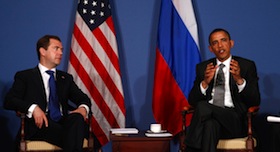Cooperation on Missile Defense Gains Speed, but Agreement Remains Distant
May 27, 2011
Featured Image
Today's top nuclear policy stories, with excerpts in bullet form.
Stories we're following today: Friday, May 27, 2011.
Missile Defense a Sticking Point for Obama, Medvedev, Despite Efforts to Push 'Reset' Button - Associated Press [link]
- President Barack Obama and Russian President Dmitry Medvedev claimed progress Thursday but achieved no breakthrough on a U.S. missile defense plan that Moscow is concerned could threaten its security.
- Medvedev expressed confidence the matter would be resolved, though not anytime soon — perhaps in the year 2020, he suggested.
- Obama, for his part, said the two sides would keep working to find “an approach and configuration that is consistent with the security needs of both countries, that maintains the strategic balance and deals with potential threats that we both share.”
Obama and Medvedev Stress Alliance - Carrie Budoff Brown in Politico [link]
- “As somebody who’s been following this stuff for three decades, I am struck … by the acceleration of the pace of cooperation, and of the willingness for both sides to look at this stuff very seriously,” McFaul said. “We haven’t gotten there yet, and it’s going to take some work.”
Top Tweets
- Russian Amb. Dimitry Rogozin (@DRogozin): I insist that the Europeans should finally have the courage to take at least some position on the US MD deployment on European soil
- US Amb. to Nato Ivo Daalder (@USAmbNATO): They Have, at Lisbon, when NATO decided to deploy MD @drogozin…
A Straitjacket for American Nuclear Strategy - Lt. Gen. John Castellaw in The Hill [link]
- Highly politicized parts of the National Defense Authorization Act (NDAA), recently passed in the House of Representatives, threaten to hamstring the American military’s ability to implement [New START].
- Two controversial parts of the NDAA...seek to constrain the ability of the President and military leaders to make strategic choices for our nuclear strategy.
- If the military decides it needs more troops, better weapons, different types of infrastructure and fewer nuclear bomb within our New START treaty obligations, why should Congress impose arbitrary limitations on its ability to make these choices?
- The Senate should strip unnecessary limitations on our strategic flexibility from its version of the bill.
A Hard-Won Victory for American Soft Power - Reza Marashi in Tehran Bureau [link]
- Last Friday, one day after the president's speech, the State Department...repealed the single-entry visa policy for Iranian students that prevented them from leaving the United States throughout the duration of their studies.Easily the most positive step forward on Iran policy since the president's 2009 Nowruz message...
- Allowing multiple-entry visas for Iranian students is a prime example of U.S. soft power initiatives that can support Iran's indigenous quest for integration while also producing a tremendous outpouring of good will.
- U.S. policies must be devised so as to send separate messages to Iran's government and its people. This is precisely what rescinding the single-entry visa policy has achieved.
Bombs Away - Gareth Evans in Project Syndicate [link]
- The threat of a nuclear weapons catastrophe remains alarmingly real.
- Cold War nuclear-deterrence doctrine is irrelevant to today’s world.
- If the existing nuclear powers sincerely want to prevent others from joining their club, they cannot keep justifying the possession of nuclear weapons as a means of protection for themselves or their allies.
- Nuclear disarmament, non-proliferation, counter-terrorism, and civil nuclear-energy risk reduction are inextricably connected, and they call for sustained commitment around a comprehensive agenda, and detailed argument.
Kim Jong Il Pledges to Pursue Nuclear-Free Korea - Global Security Newswire [link]
- "We hope to ease the situation on the Korean Peninsula, adhere to the goal of a nuclear-free Korean Peninsula and call for the early resumption of the six-party talks," Kim Jong Il was quoted by the official China Central Television as saying.
- North Korea has repeatedly said it is willing to return to the multinational talks it abandoned in spring 2009 on an unconditional basis. That is not acceptable for Seoul, Tokyo and Washington, which want Pyongyang to first demonstrate its commitment to lasting nuclear disarmament.



